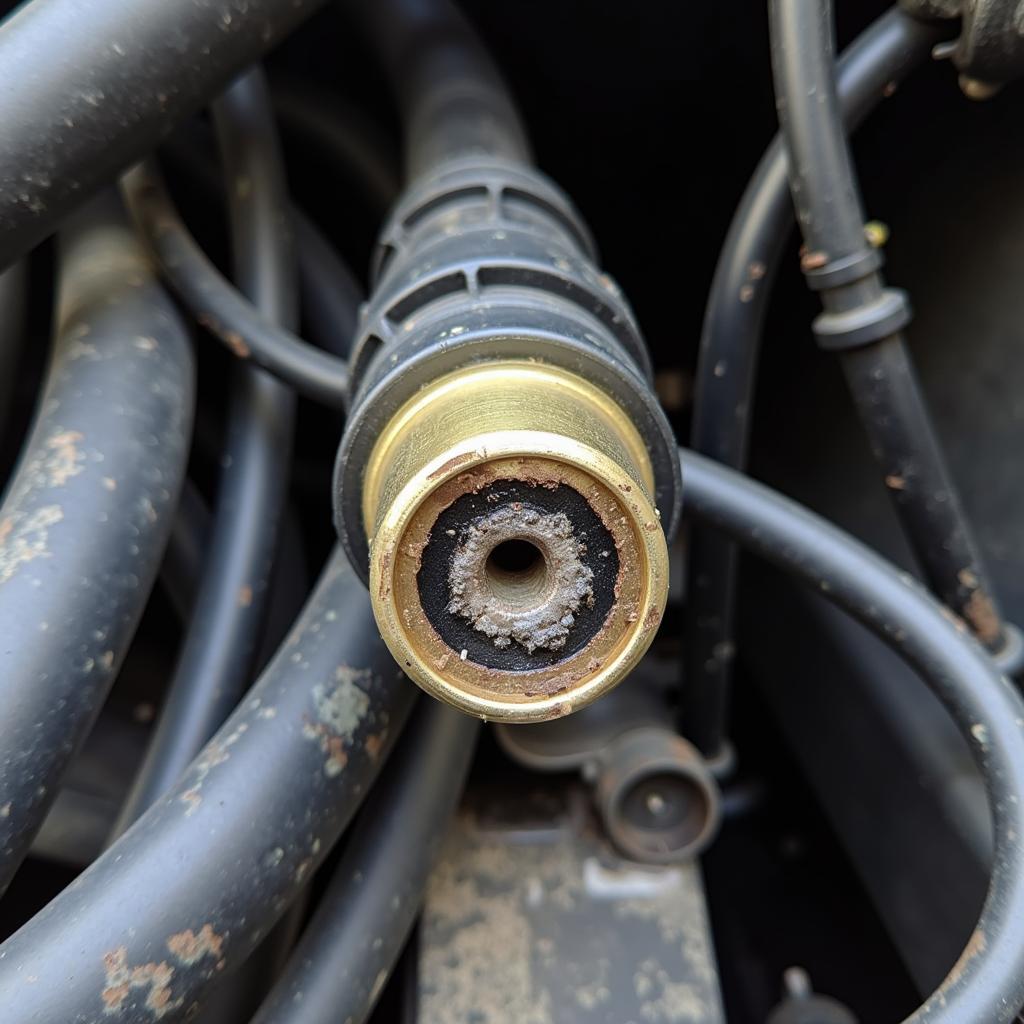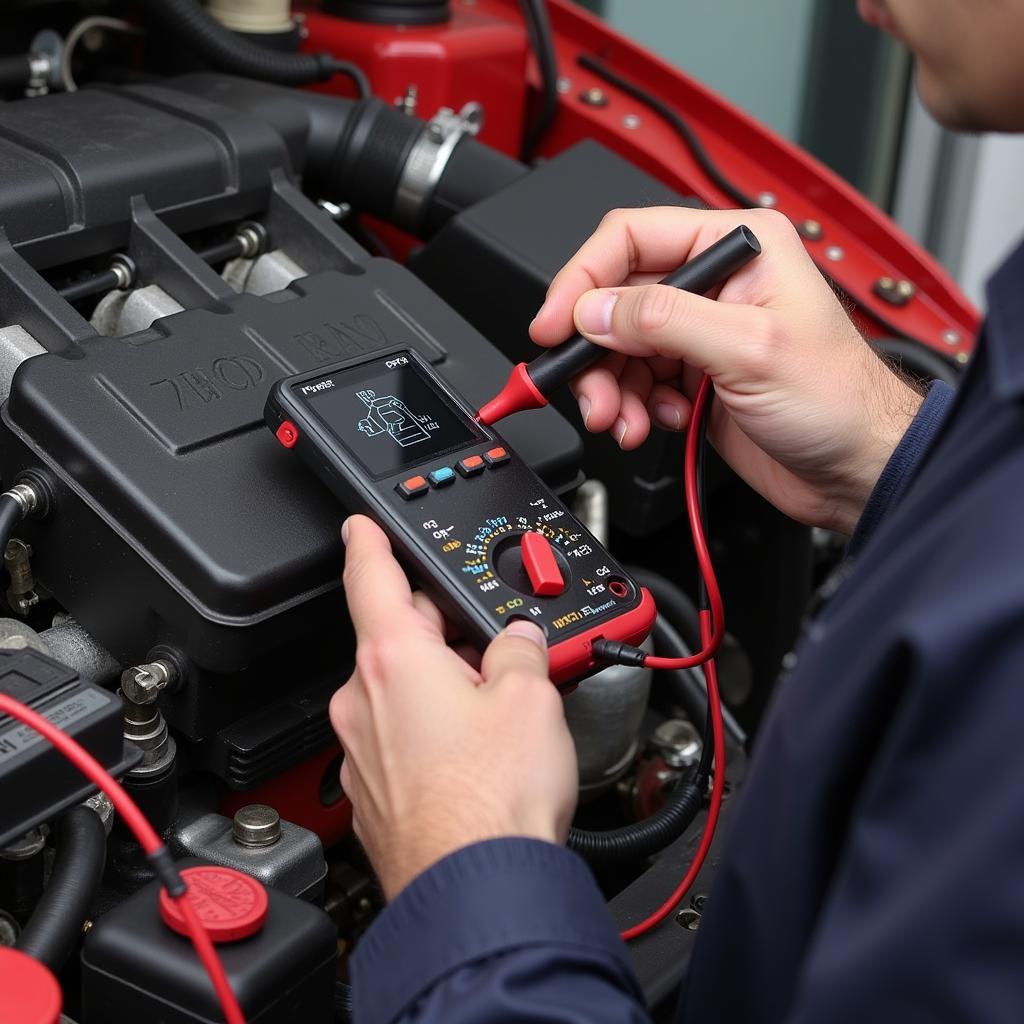A car’s rev meter, also known as a tachometer, is a crucial instrument that displays the engine’s rotational speed in revolutions per minute (RPM). A malfunctioning rev meter can signal underlying engine issues or electrical problems. Understanding the common causes of Car Rev Meter Problems and how to troubleshoot them can save you time and money. Let’s dive into the details of this sometimes perplexing issue.
If your car is experiencing problems starting, you might want to check out some troubleshooting tips. For more insight into car electrical issues, consider reading more about defining car electric problems.
Understanding the Car Rev Meter
The rev meter provides valuable information about your engine’s performance. It allows you to shift gears efficiently, avoid over-revving, and identify potential problems early on. A fluctuating, inaccurate, or completely dead rev meter can indicate various issues, ranging from simple loose connections to more complex sensor or wiring problems.
Common Causes of a Malfunctioning Rev Meter
Several factors can contribute to car rev meter problems. These include:
- Faulty Instrument Cluster: The instrument cluster houses the rev meter and other gauges. A malfunctioning cluster can cause multiple gauge readings to be inaccurate or fail altogether.
- Loose or Damaged Wiring: Wires connecting the rev meter to the engine control unit (ECU) can become loose, corroded, or damaged, disrupting the signal and causing erratic readings.
- Bad Crankshaft Position Sensor (CKP): The CKP sensor provides the ECU with information about the engine’s speed and position. A faulty CKP sensor can lead to incorrect RPM readings or a complete rev meter failure.
- Ignition System Problems: Issues with the ignition coil, distributor, or spark plugs can affect the engine’s firing sequence, leading to inaccurate rev meter readings.
- ECU Problems: The ECU is the brain of your car’s engine management system. A faulty ECU can disrupt various signals, including those sent to the rev meter.
 Faulty Crankshaft Position Sensor in Car Engine
Faulty Crankshaft Position Sensor in Car Engine
Troubleshooting Car Rev Meter Problems
Troubleshooting car rev meter problems requires a systematic approach to identify the root cause. Here’s a step-by-step guide to help you diagnose and fix the issue:
- Visual Inspection: Check all wiring connections related to the rev meter and the CKP sensor for looseness, corrosion, or damage.
- Check the Fuses: Inspect the fuses related to the instrument cluster and the engine management system. A blown fuse can easily cause a rev meter malfunction.
- Test the CKP Sensor: Use a multimeter to test the CKP sensor’s resistance and voltage output. Compare the readings with the manufacturer’s specifications.
- Scan for Diagnostic Trouble Codes (DTCs): Use an OBD-II scanner to check for any stored DTCs related to the rev meter, CKP sensor, or ECU. These codes can provide valuable clues about the problem.
- Check the Instrument Cluster: If other gauges are also malfunctioning, the problem may lie within the instrument cluster itself. A replacement or repair might be necessary.
If you are unsure about performing these steps yourself, it’s best to consult a qualified mechanic. They have the expertise and tools to diagnose and repair car electrical problems effectively. For those interested in reliable used cars, we have a resource on finding the best used car without a lot of problems.
“A common mistake DIYers make is assuming the worst and replacing parts unnecessarily,” says John Smith, a certified automotive technician with over 20 years of experience. “Systematic troubleshooting is key to identifying the real culprit behind a car rev meter problem.”
 Mechanic Testing Crankshaft Position Sensor with Multimeter
Mechanic Testing Crankshaft Position Sensor with Multimeter
Why is my car revving high but not accelerating?
This could be due to a slipping clutch, transmission problems, or a faulty sensor.
Can a bad alternator cause rev meter problems?
While a bad alternator primarily affects the charging system, it can indirectly cause erratic rev meter behavior in some cases, especially if the voltage drops significantly.
What is the normal RPM range for a car?
The normal RPM range varies depending on the car and driving conditions, but typically falls between 600-800 RPM at idle and up to 6,000-7,000 RPM under acceleration.
Is it safe to drive with a faulty rev meter?
While driving with a faulty rev meter is possible, it’s not recommended, as it can make it difficult to shift gears properly and potentially damage the engine. You also might want to know more about troubleshooting car starting problems.
How much does it cost to fix a car rev meter problem?
The cost of repair depends on the underlying cause. A simple loose wire fix might be inexpensive, while a faulty ECU replacement can be costly. Ballast problems can also contribute to electrical issues in a car.
Conclusion
A car rev meter problem can be a symptom of various underlying issues. By following a structured troubleshooting approach, you can identify the root cause and take appropriate action. Remember, a properly functioning rev meter is essential for optimal engine performance and fuel efficiency. If you’re still struggling to solve the issue, don’t hesitate to contact us at AutoTipPro at +1 (641) 206-8880 or visit our office at 500 N St Mary’s St, San Antonio, TX 78205, United States. We’re here to help get your car back on track.







Leave a Reply